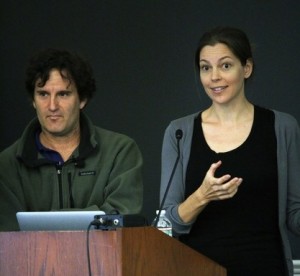
The Professors: This is what would happen if you took Heidi Klum, crossed her with a chemical biologist and then made her stand next to a mathematician who is fond of fleece.
Some believe they herald a new dawn of equality in learning and some think they are the ruin of the American educational system, but regardless of how you feel about MOOCs (Massive Open Online Classes), there are more of them being offered with every passing semester. The idea is that anyone can audit a digital course from a prestigious university (for free, provided one doesn’t want academic credit for it), which is how I ended up attending my first Harvard class, Science and Cooking, while eating leftover pad thai in my pajamas.
One of the allegations against MOOCs is that they can’t possibly be rigorous enough to mirror an actual university class (see: pajamas, leftover pad thai), and I admit that the first few pitches in Science and Cooking seemed like big, slow-moving softballs. There were some fun facts about the invention of the pressure cooker and the modern oven. There was Ferran Adria jumping around and talking about spherification of yogurt like it was a religious experience. There was a music video about El Bulli (Adria’s famous restaurant) featuring a compilation of pretty food pictures edited together at a breakneck pace and set to music that would not have been out of place in a Hans-Zimmer-composed uber-dramatic film soundtrack. This was going to be a piece of cake.
And then I arrived at Lecture #2, in which the actual professors (a German chemical biologist and a mathematician who always looks like he just woke up from a nap) took the reins of the class back from the celebrity chefs. We started to calculate how many molecules were in a batch of chocolate chip cookies. Wait, what’s Avogadro’s number again? Am I really supposed to already know that water is a byproduct of the formation of triglycerides? How the hell am I supposed to know what protein is found in an egg and what its shape is like? And can I even solve logarithms without first locating the graphic calculator that I haven’t turned on since I was seventeen? Continue reading
